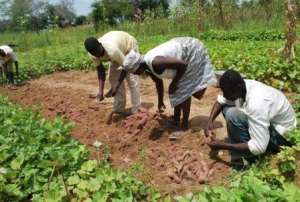
Africa's farmers and agribusinesses could create a trillion-dollar food market by 2030 if they can expand their access to more capital, electricity, better technology and irrigated land to grow high-value nutritious foods, says a new World Bank report.
The report “Growing Africa: Unlocking the Potential of Agribusiness,” calls on governments to work side-by-side with agribusinesses, to link farmers with consumers in an increasingly urbanized Africa.
“The time has come for making African agriculture and agribusiness a catalyst for ending poverty,” says Makhtar Diop, World Bank Vice President for Africa Region. “We cannot overstate the importance of agriculture to Africa's determination to maintain and boost its high growth rates, create more jobs, significantly reduce poverty, and grow enough cheap, nutritious food to feed its families, export its surplus crops, while safeguarding the continent's environment.”
According to the report, Africa's food and beverage markets are projected to reach $1 trillion by 2030, tripling the current market size of $313 billion.
This will bring more jobs, greater prosperity, less hunger, and significantly more opportunity that enable African farmers to compete globally, said the report.
The report argues that adverse trends like falling export shares and rising food imports can be reversed through good policies, sustained public-private investment, and strong public-private partnerships backed by open, transparent procedures and processes along the entire value chain.
Africa has more than half of the world's fertile yet unused land – only two percent of the continent's renewable water resources are used compared to the global average of five percent. Post-harvest losses run 15 to 20 percent for cereals and are higher for perishable products due to poor storage and other farm infrastructure.
While pointing to the need for significant investment in infrastructure the report carries an unequivocal warning: in the rush to allocate land for agribusiness, care needs to be taken so that acquisitions do not threaten people's livelihoods and land purchases or leases are conducted according to ethical and socially responsible standards, including recognizing local users' rights, holding consultations with local communities, and paying fair market-rate compensation for land acquired.
The report also took an in-depth look at entire value chains – the process for taking products from farms to markets – for five commodities, rice, maize, cocoa, dairy and green beans.
Africa is the world's leading importer and consumer of rice, paying US$3.5 billion for import bills.
Ghana, a top importer, produces more varieties of rice but at significantly higher cost.
“Improving Africa's agriculture and agribusiness sectors means higher incomes and more jobs. It also allows Africa to compete globally. Today, Brazil, Indonesia and Thailand each export more food products than all of sub-Saharan Africa combined. This must change,” says Jamal Saghir, World Bank Director for Sustainable Development in the Africa Region.
The report says agriculture and agribusiness should be at the top of the development and business agenda in Sub-Saharan Africa. Strong leadership and commitment from both public and private sectors is needed.
For success, engaging with strategic “good practice” investors is critical, as is the need for strengthening of safeguards, land administration systems, and screening investments for sustainable growth.
Concluding on an upbeat note, the report says Africa can draw on many local successes to guide governments and investors toward positive economic, social and environmental outcomes.
“African farmers and businesses must be empowered through good policies, increased public and private investments and strong public-private partnerships,” says Gaiv Tata, World Bank Director for Financial and Private Sector Development in Africa. “A strong agribusiness sector is vital for Africa's economic future.”




 Dumsor: Don't rush to demand timetable; the problem may be temporary — Atik Moha...
Dumsor: Don't rush to demand timetable; the problem may be temporary — Atik Moha...
 Space X Starlink’s satellite broadband approved in Ghana — NCA
Space X Starlink’s satellite broadband approved in Ghana — NCA
 2024 election will be decided on the grounds of the economy; choice of running m...
2024 election will be decided on the grounds of the economy; choice of running m...
 Dumsor: We're demanding less; just give us a timetable — Kwesi Pratt to ECG
Dumsor: We're demanding less; just give us a timetable — Kwesi Pratt to ECG
 Do I have to apologise for doing my security work, I won’t – Simon Osei-Mensah r...
Do I have to apologise for doing my security work, I won’t – Simon Osei-Mensah r...
 All my businesses have collapsed under Akufo-Addo — NDC Central regional chair
All my businesses have collapsed under Akufo-Addo — NDC Central regional chair
 Military, Prison Officers clash in Bawku, three injured
Military, Prison Officers clash in Bawku, three injured
 GRA-SML contract: MFWA files RTI request demanding KPMG report
GRA-SML contract: MFWA files RTI request demanding KPMG report
 Court threatens to call second accused to testify if NDC's Ofosu Ampofo fails to...
Court threatens to call second accused to testify if NDC's Ofosu Ampofo fails to...
 Family accuses hospital of medical negligence, extortion in death of 17-year-old...
Family accuses hospital of medical negligence, extortion in death of 17-year-old...
